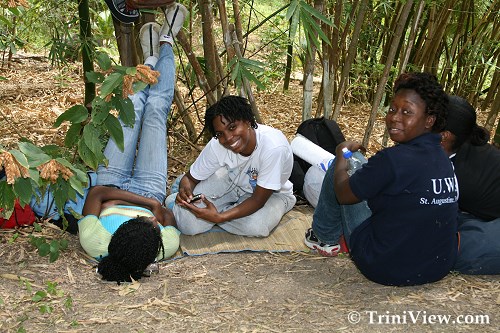 UWI students at Fondes Amandes Gayap in Chickland
UWI students at Fondes Amandes Gayap in Chickland
TriniView.com Reporters
Event Date: March 04, 2007
Posted: March 18, 2007
On Sunday 4th March, 2007, the last leg of the annual Gayap organized by the Fondes Amandes Community Reforestation Project (FACRP) came off at Sou Sou Lands in Chickland, in Central Trinidad. Gayap means to 'lend a hand' and it is a form of communal labour where members of the community come together and work towards some specific goal. The St. Anns based FACRP, led by their director Akilah Jaramogi along with a group of students from the University of the West Indies, met anthropologist and permaculture (permanent culture) designer Dr. Hugh Skinner who welcomed them to Sou Sou Lands. He explained that the farm space is an experiment in intelligent sustainable development.
Surrounded by greenery which was somewhat diminished by the dry season weather, the Gayap crew settled into the space and began to set up hammocks and tables for the food area. One of the main purposes of this Gayap was to cut 'fire traces' by clearing away brush so as to minimize and contain any bush fires that may start in the dry season. Experienced FACRP members led this process.
While some cleared the brush to make the 'fire traces', a next group worked on constructing a permaculture system that would facilitate the transformation of waste into a fertilizing agent for plants. This crew included famous Orisha drummer 'Knocker', Michael Bullen and Hugh Skinner. From time to time, the singing of Orisha songs would start, accompanying the rhythmic digging of the trenches.
In the midst of the work a lively discussion started as to the state of agriculture in the country. Dr. Skinner commented that the varieties of crops are being destroyed by the focus on engineered 'super crops' and initiatives such as 'Seed Savers' being instrumental in the preservation of different species. Another person commented that there is no sustainability in society without sustainability in agriculture and said that agriculture should be made a priority. Another brought up the issue of the Post Emancipation period in Trinidad, where colonial authorities created a range of laws and policies that limited and controlled land ownership and thus reduced the ability of free Africans to engage in independent agricultural production.
The overhead sun peaked and started its slow downward descent. The group stopped for lunch, graciously provided by the FACRP. Making use of the natural environment, they sat in makeshift hammocks strung between the bamboo and on blankets spread out under shady trees to have lunch.
Everyone soon gathered in a shady, naturally made amphitheatre for an information/cultural session. Akilah Jaramogi, director of FACRP, briefly touched on the history of the FACRP and their ongoing concern for the environment since 1982. She emphasized the importance of living ecologically within one's environment, that is, living in such a manner as to cause minimal destruction to the ecological system. Jeffrey Stollmeyer spoke afterwards, expressing that 90 percent of the food that is consumed locally is imported, emphasizing the need to grow more food. He explained the role of permaculture in this process. Permaculture according to one definition is "both a philosophy or lifestyle ethic as well as a design system which utilizes a systems thinking approach to create sustainable human habitats by analyzing and duplicating nature's patterns."
Dr. Hugh Skinner advocated a multi-pronged approach to agricultural/environmental issues highlighting the need for persons to look critically at their lifestyles and become as self sufficient as possible. He made a presentation of several copies of his recent book 'Satan in Sin James' to Akilah Jaramogi and the FACRP library. He explained that the book is a collection of his writings over the years for the Trinidad Review.
Steve Theodore Cupid addressed the gathering, questioning how can there be self sustainability when so many of government's policies have been against people owning land. He linked present attitudes around land to colonial practices. Questioning what he termed an ideology, that is, the notion that the upper classes can make the best use of land, he criticized the country's attitudes towards certain residents and squatters.
Akilah Jaramogi then shared some lessons as to how to deal with a bush fire, which the FACRP is trained to handle. After this informational aspect of the gathering, she shared a poem on community spirit and protecting the environment. The rhythmic sounds of drums then rang through the natural amphitheatre as Brother Knocker shared some songs with the gathering. Persons sang along and danced to the medley of Calypso, folk, reggae and Orisha songs. Sherline Chase of the UWI contingent delighted the gathering by singing a Calypso song. Akilah shared the fact that the day was the anniversary of the passing of Tacuma Jaramogi, a founding member of the Fondes Amandes Community Reforestation Project (FACRP). A couple of Orisha songs were sung in his memory.
With the gathering having ended, persons made their way to their vehicles to start the journey back to their respective locations. Driving out of Chickland, we passed two bush fires, showing the importance of the work being done by the FACRP to bring attention to the various mechanisms of preventing bush fires.
Fondes Amandes Gayap in Chickland in pictures:
www.triniview.com/gallery/main.php?g2_itemId=163150
Homepage | Fondes Amandes | Photo Gallery
|
